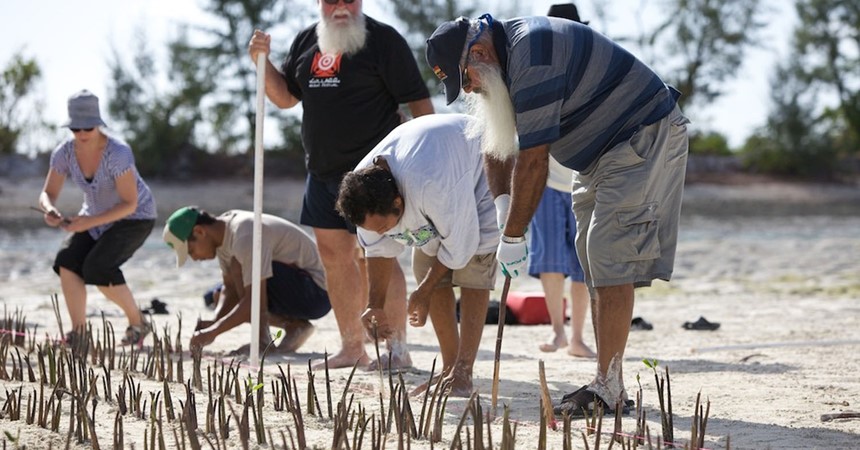So what do nations that are made up of small far-flung atolls rising no more than 3 or 4 metres above sea-level do as they begin to experience the destructive effects of climate change?
Since 2006, the Pacific Calling Partnership (PCP) has worked alongside Kiribati and Tuvalu climate campaigners trying to call the Australian and world communities to face up to the challenges and dangers of climate change. PCP has led numerous joint delegations to UN climate conferences and taken key leaders to Kiribati and Tuvalu to give them a deeper understanding of what is happening. Each year, PCP brings two young leaders from Kiribati and two from Tuvalu to Australia for the Kiribati-Australia-Tuvalu Exchange Program (KATEP), aimed at providing them with opportunities to develop their skills, experience and confidence in climate change advocacy.
I would like to give you a glimpse into the human struggle of our neighbours by sharing some of the thoughts and feelings they have shared with me.
They want a safe future yet already they are beginning to experience bigger storms and waves that increase coastal erosion, knock over coconut, banana and pawpaw trees and make wells brackish. Merineta explained to Malcolm Turnbull and other politicians when she came to Australia in 2015, “I am the mother of a seven-month-old baby and I am worried about his future and his life. All of the children of Tuvalu have a right to life – a right to an environment with good quality. They are all part of this world and they want to have a normal life like other Australian kids.”
They try to adapt but it is not so easy to respond to the longer droughts that damage and sometimes kill the huge, abundantly productive breadfruit trees, lower water levels in wells and dry out rainwater tanks. Linda from Kiribati explains the difficulty, “Yes, we accept that we must do what we can to protect our coasts and water resources threatened by thoughtless pollution, but serious and sustained adaptation is a great unknown – it requires major funds and some of the world’s finest minds to point the way.”
Reverend Tioti Timon from Kiribati explained, “From losing our fresh water we are ending up with more problems….the relocation of people within the islands to find places that can provide them with fresh water.” They try to relocate internally and it leads to over-crowding.
Drought affects the education of young women. A 16-year-old Tuvaluan girl spoke sadly to me about life in a drought. “We can have one bucket of water only a day. So we could use water only for washing dishes and for cooking.” She spoke of how awful it was going to school without being able to bathe. She and her friends decided it was preferable not to go to school.
Women build food gardens to supplement their family’s reliance on processed food. When a huge storm surge overruns the gardens with waves of salt water they feel disheartened. M, a middle-aged woman, lives in a heavily populated part of Kiribati. Her house, food gardens and well now fill with rubbish, sand and manure more often. Some of the wells and some of the gardens are beyond fixing. M and others in her community are desperately worried about the costs of feeding their families.
Besides an overwhelming fear of loss, Islanders are also frustrated. A member of the Tuvalu Climate Action Network (TuCAN) told me in 2011, “We are tired of consultations. Our land needs protecting now! It is disappearing now! How can we protect it by planting trees when the waves keep coming in? We need to stop the waves.”
Everywhere in the Pacific, there is a strong determination to preserve the cultures that weave together family and community with food production, fishing, music, song, dance, and celebration by fighting climate change. Tiiringatea from Kiribati told Australian communities in 2015, ‘I am 20 years old, I love my country. I love and respect my culture. I don’t want to move to another country. Without my culture I am nothing. I have every right to stay in my country and practise my culture. A precious part of my culture is dancing. I love to perform my traditional dance because it is not just about entertaining people but it is also our way to show people that this culture is very important to us.”
One of the most important and effective strategies Pacific Island nations have employed to safeguard their future is to develop courageous and inspirational leaders.
Pelenise Alofa, Executive Director of the Kiribati Climate Action Network (KiricAN), is an example. She addressed the Human Rights Council in Geneva in 2015 saying,
“Mr President, we have three recommendations to the Human Rights Council this morning. First, to recognise the adverse effects of climate change on the enjoyment of human rights; (2) to establish the position of a special rapporteur on human rights and climate change at the UN office; (3) to launch a work program to ensure that human rights are integrated into all aspects of climate actions….”
Tong, who has just retired after 12 years as President of Kiribati, was nominated last year for the Nobel Peace Prize in recognition of his efforts. In 2012 in his address to the UN he said, “Whether or not we are willing to acknowledge it, climate change and sea level rise are a result of the unsustainable use of our planet's resources. Economic growth at all costs must not be our mantra, particularly when it is those who will benefit the least from this growth who will pay the ultimate price. The earth is not ours to do with as we please - we are merely trustees for future generations. We ignore this reality at our peril.…”
Jill Finnane co-ordinates ERC's EcoJustice campaign and is co-convenor of the Pacific Calling Partnership. She is an active member of the CLRI (NSW) Social Justice Committee and previously worked for Action for World Development where she was a foundation member of the World Development Tea Co-op. To learn more and become involved, please visit www.erc.org.au and http://pacificclimatewatch.com.au/wp/.




























































































